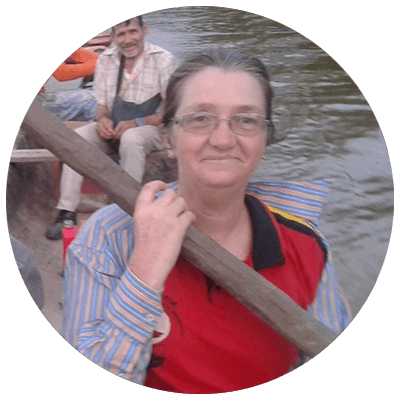
Share
It was a warm morning and the sun was shining through the windows of the small chapel in Riberalta, a small town in the Bolivian Amazon. The room was filled with Doña Peregrina’s family. She was 65 years old and would be baptized. All her children and grandchildren had already been baptized, but as a child she lived deep in the forest and did not have the opportunity to go to school or receive the Holy Sacrament. Her desire was always to approach the Eucharistic table. Baptism was the first step. I remember my excited voice as I said, “Peregrina [her name means pilgrim], in the name of God the Father, God the Son and God the Holy Spirit, I baptize you.” As women who want to be seen and recognized, it was an act of faith for her and for me.
My name is Ciria. Let me tell you how I came to this place. After serving the sick of my country in Brazil for 28 years and serving as Executive Secretary of the Conference of Religious of Brazil, one morning at the end of 2012 my superiors invited me to move to the Bolivian Amazon, to be a “human impulse” in mission. “Human impulse?” I asked myself so many times these years, while healing indigenous and rural children and mothers in boats named Coeli, Santa Maria and Guadalupe. God only knows how hard it was for me to discover its meaning and implication.
I come from a family of farmers in Santa Catarina, southern Brazil, and I have six sisters and four brothers — so many of us that we make a soccer team! I was formed in the Congregation of the Sisters of Divine Providence and was consecrated in 1996. That same year I graduated in Nursing and Midwifery. My two pillars in life are serving God and caring for the sick.
I arrived in Bolivia, but my heart was still in Brazil. Bishop Luis Casey, then the apostolic vicar of Pando, Northern Bolivia, heard my desire to work with the Xavantes indigenous people in Mato Grosso, Brazil, and with much enthusiasm he told me, “We have a similar work here.” I joined the Rural Pastoral Institute. What wisdom in the holy words: Go and build the Kingdom of God wherever you live!
When I joined the Institute, there were two priests and four lay people. Today, we no longer have priests, so in 2016 I became responsible for the Institute. From 2016 to 2018 we served 300 indigenous and rural communities, some as far away as 375 miles by river. After 2018, my territory decreased a little to serve 164 communities. I remember the year (2015) in which I administered the first baptism, followed by many others, with the bishop’s authorization. In these years, I have presided over 670 Baptisms. We have prepared 574 people for First Communion and 402 for Confirmation. I have officiated two weddings.
This ministry demands a lot of effort, study, listening, silence and total dedication and trust in God. God chooses me and enables me to heal the sick and do the pastoral work of evangelization, while learning a new language, culture, habits and customs. Women like Doña Peregrina are the life of rural communities. It is they who day-after-day keep family life and Christian education alive. Submission to men is still very strong. Clericalism and machismo still prevail. As a woman, a religious and a foreigner, I have suffered a lot. It has been a very challenging time for me to revisit my understanding and assumptions, which continues today.
We travel in pairs to be with the communities. In the rainy season, we go in our boat, our floating parish of about 40 feet by 12 feet, that we call Guadalupe. Our trips last from 10 days to a month, enjoying God’s creation and passing through countless dangers.
Today, as I sail on the Beni River toward the next community, I remember the words of the superiors eight years ago: to be a “human impulse.” I assure you: God walks with those who set out on a journey. God indicates the direction and enables the one chosen. Therefore, Peregrina prepared for her baptism with immense joy, and I prepared myself to officiate the Sacrament with immense responsibility, so that all her sins would be forgiven, to live a moment of faith after almost a lifetime of participating and waiting to be seen. Divine Providence passed through her hands and mine, the hands of faithful women.
Sr. Círia Mees, a Sister of Divine Providence, was born in Santa Catarina in southern Brazil, and currently serves as the director of the Rural Pastoral Institute in the Apostolic Vicariate of Pando, Bolivia, in the Amazonian territory.
This story is edited, updated and translated from the original Spanish, with the permission of Núcleo Mujer of the Pan-Amazonian Ecclesial Network.
Receive Our Newsletter
This is the hub where we share relevant news, events and opportunities to participate in the work.
*We will send the newsletter only once each week, and we will never share or sell your information.


